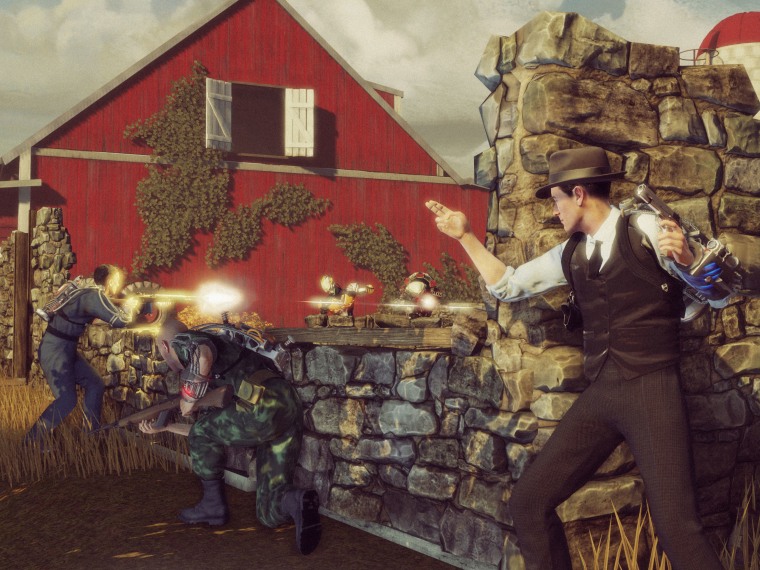When it comes to shooting at aliens with lasers, there are countless video games with gravelly-voiced protagonists and little green men. Few have attracted the cult following or critical acclaim of "XCOM," a series of punishingly difficult turn-based strategy games that require players to use all of their intellectual resources just to survive a seemingly endless assault of extraterrestrials.
And while publisher 2K Games stuck to the tried-and-true series template with last year's reboot of "XCOM: Enemy Unknown" (and earlier this summer with the game's port to iOS platforms), the company best known for its acclaimed and otherworldly "BioShock" series had another idea for how to carry on the alien-shooting tradition: how would "XCOM" work as a third-person shooter?
After NBC News got a chance to play through the first five hours of the recently re-announced "The Bureau: XCOM Declassified," I can say: surprisingly well. It only does so, however, by taking out a lot of what would strike longtime "XCOM" fans as the core experience of the series.
For starters, "The Bureau" actually has a story, and not just the "kill the alien invaders" kind — though that's certainly a big part of it. The "XCOM" universe has been repainted in a Norman Rockwell-ish pastiche of 1960's America, which makes it look sort of like a sci-fi mash up of "Mad Men" and "Star Trek." Players assume the role of William Carter, a predictably gruff FBI agent with a haunted past that never manages to upset his pragmatic ability to shoot at bad guys.
Erik Caponi, "The Bureau's" narrative designer, said at a New York preview last week that the team wanted to give the game an "early sixties covered in foil, mad science kind of look" to reflect the hyperbole of the space race and the looming tension of the Cold War. He wanted Carter and his fellow agents to wear suits like in "Men in Black," rather than the military-grade fatigues characters donned in "Enemy Unknown" to preserve an air of political intrigue.
And the aliens needed more recognizable, almost human motivations for invading Earth. Jeff Weir, the game's art director, said that this meant creating more human-sized, bipedal types of aliens rather than relying on abstract, animalistic bad guys like the classic xenomorphs from the "Alien" series.
Assured, aesthetic quality
"The Bureau" certainly has a unique and assured aesthetic quality about it. But fans of the franchise care more about how well the game manages to keep alive the "XCOM" spirit — something that has almost nothing to do with its story. Even Caponi joked that some people have been shocked to hear so much dialogue in an "XCOM" game in the first place.
"'XCOM' isn't very lore-heavy," Caponi said. "What makes XCOM XCOM is a lot of gameplay elements."
"The Bureau" is a different game than "Enemy Unknown," sure. Diehard "XCOM" fans may write the game off completely because it abandoned any trappings of turn-based gameplay in favor of an ability called "Battle Focus," which slows down time to allow Carter to send orders to the other two agents that accompany him on missions.
But what "The Bureau" loses from "XCOM's" strategic prowess, it makes up for in urgency. Having combat unfold in real time is already an invigorating experience for any shooter fan, but where "The Bureau" excels is in making Carter's tactical abilities a necessity. While a squad-based shooter like "Mass Effect" let players steer their AI-controlled allies around, you could still play through the entire game without actually ever doing so. When I tried to make it through one alien-infested street in "The Bureau" without keeping close track of Carter's fellow operatives, I quickly found myself surrounded by aliens and a "game over" screen.
Not sure what else to do, I rebooted the game and tried to play through the level again, this time much more thoughtfully. With so many bland and repetitive shooters available already, it was a refreshing to play a game that forced me to consider my every move before just running around and shooting things.
"We had to make the game hard enough to force you to use all of the tactical elements," Caponi said after I finished the level. "Otherwise, it wouldn't be a tactical game!"
Yannick LeJacq is a contributing writer for NBC News who has also covered technology and games for Kill Screen, The Wall Street Journal and The Atlantic. You can follow him on Twitter at @YannickLeJacq and reach him by email at: Yannick.LeJacq@nbcuni.com.
